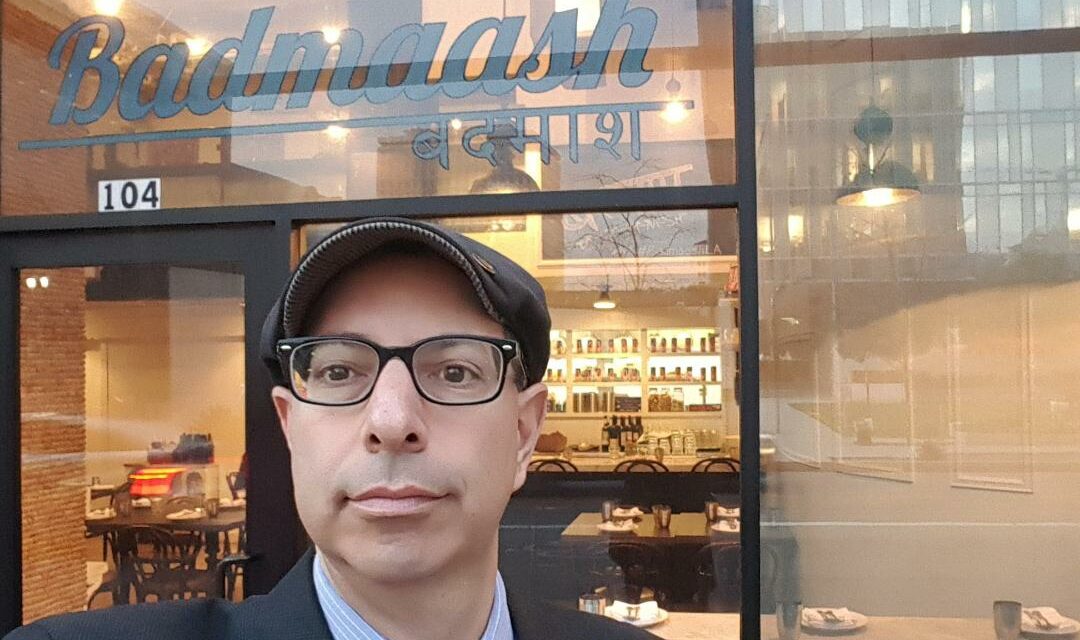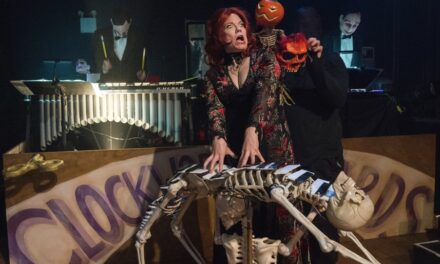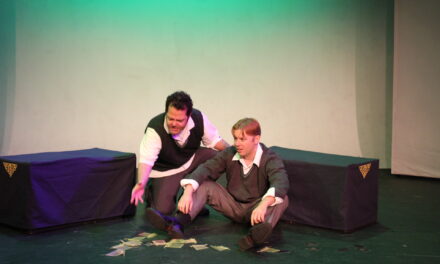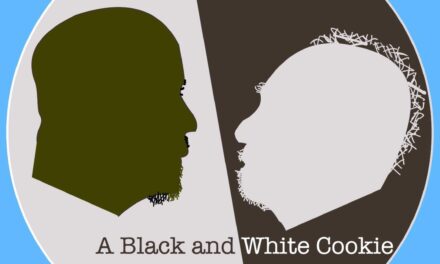Jonathan Dorf is a Los Angeles playwright and screenwriter with work produced worldwide. He’s attended international theatre festivals and continues to engage young playwrights by doing workshops and providing material for them to evolve their style. His work centers around producing plays for high school students in order to get them engaged in the art of theatre. His plays have left an impact on students considering middle school and even college students have performed his plays. Today, he shares his passion of theatre with audiences and is hopeful for tomorrow’s theatremakers.
The following conversation has been edited.
VD: You pursued your MFA in playwriting at UCLA. What is the best piece of advice that you receive to evolve your playwriting style that you did not receive at Harvard?
JD: That’s an interesting question. I don’t know that there was a particular piece of advice. There was a lot of things I learned about playwriting particularly from Leon Katz, who, it’s interesting, wasn’t a part of the playwriting program. He used to be co-chairman of dramaturgy at Yale. I think a lot of the ways that I approach playwriting in terms of structure and also about exposition, I learned from Leon. For example, context, it is not the single most important thing, but it is an important lesson to understand in terms of relationship. For example, high and low context relationships. I think it’s something that I do unconsciously. I think it certainly is good for beginners to have this idea of not writing conversations between characters who have known each other for years and yet they sound like they just met. I was just at KCACTF [Kennedy Center American Theater Festival] last week, talking about some of those issues with some of the writers who are college students. If you’re having characters that are having an important conversation, it has to be written with that understanding. That was one of the more important things. It doesn’t mean that the information was not present at Harvard, but it was not present in that language. I think I was more capable of understanding at that point [during the MFA].
VD: You offer plenty of tips in Playwriting 101, and on your website for free, which is great by the way. You mentioned producing a finalized script with intact neat grammar. How do you feel that today’s social media climate has impacted our ability to communicate with one another?
JD: It probably hasn’t helped (laughs). I mean on the one hand, it is great. It’s fun because you get a little immediate gratification. People hit “like,” etc. But I know grammar seems to have spiraled downward. I guess in social media you see people shortcutting words. It’s interesting to see how that use of language is sort of affecting the language on the page. Though at the same time I don’t see that plays are noticeably worse than they were 20 years ago. I’m actually reading a bunch of plays for Florida Thespians right now, they seem like they’re in decent shape. These are the better group of writers though, so you would think that their work would be a little cleaner. I do think sometimes that there is a lack of attention to detail in general among writers. I don’t know if that’s due to social media, but I don’t think social media has helped us in that way.
VD: In Young Playwrights 101, you talk about the importance of proceeding with caution when writing about a specific cause, so you don’t sound too “preachy.” At the time, you had just written Now You See Me. How has the message in your play shifted in Declaration? Did you find yourself taking extra precaution in writing Declaration due to increasing gun violence?
JD: You know, I wrote Declaration 20 years after the first one [Now You See Me]. I’m not the same person I was 20 years ago. I think that our feelings on gun violence has shifted as a society. I don’t remember it being quite a thing back in the late 90s. Obviously, Columbine happened in ’99. The 20th anniversary is coming up on April 20th. I wrote Now You See Me in the summer of ’99 after Columbine. So, Now You See Me is a very different kind of play, it’s almost absurdist. First of all, there had been a lot of plays about gun violence before so what I particularly did not want to do is put the shooter on stage. Now You See Me does [put the shooter on stage]. I felt like there were enough plays about the shooter out there, so that’s one of the things I wanted to address. I think also at that point my style had evolved. I do a lot of these a vignette style plays. I did want to be careful to not be preachy about it. There’s a schism between parts of the country. I’m in the group of people that thinks we have too many guns and it’s too easy to get them. But at the same time, we don’t need to have that conversation with ourselves. I wanted to write a play that wasn’t particularly political, rather looking at what was happening for these people. There are one or two people that are direct victims in the play, but for the most part, we’re watching people try to work their way through this. I tried to strike all the stuff that said “let’s ban guns” while still allowing characters to have those viewpoints. There’s a character in Boxes And Barricades who wants a gun and says that they would feel safer if they had one. I wanted to allow that point of view to be heard in the same way as in Shadow Of The Valley. There’s a character there that expresses the opposite viewpoint. I wanted those viewpoints to be heard, but I wanted people to be able to talk about it. I didn’t want them to immediately make up their minds about what the play is talking about. I just wanted them to see the experience of the people. Obviously, some people are going to immediately assume otherwise and be closed-minded about the play just because it’s a play about a school shooting.
VD: I did read the preview of the play on your website – it was interesting to see the different episodes of the classroom to the cafeteria and sort of see what those kids were going through. Why did you feel the need to donate the royalties from Declaration to the Never Again Foundation?
JD: So, we’re donating to March For Our Lives. We created the Declaration initiative, where there were 10 or so schools. All of them were doing the play around the premiere weekend around the anniversary of Parkland on February 14th. It was just one of those things that we wanted to do. In talking to Jason Robert LeClair, the director, part of it was his idea. I jumped in and donated the royalties for those particular performances. We have raised about $4,000. It will probably be a bit more by the time it’s done because I don’t have the numbers on some of the other ones. Hopefully, we’ll have raised at least five. I thought that was great because although the play is trying to be somewhat balanced and avoid politics, that doesn’t mean the playwright and the other people involved don’t have politics. I think the takeaway will be very hard to watch and think “oh we need more guns.”
VD: I’ve looked at a few of your other plays and saw that they’re written for mainly high school students and a little bit older. Why do you feel like writing plays for young students is important and do you see yourself writing for older performers in the future?
JD: It was a market that I fell into in the 90s, both because I was teaching at a prep school and so sometimes I would write for a curtain-raiser for students. The particular show that I was directing at the time did not have enough roles, and there were more people who wanted to participate so I wrote some plays there. Dear Chuck and Day One had quite a bit of traction over the years. People thought I was reasonably decent in it.
The problem is that there really aren’t that many good plays for performers at that age who can speak in a way that they find is credible and address their concerns. I think they’re important because these are the theatremakers and theatre audiences of tomorrow. It seemed to be a good fit for me in particular. Once you get in it, you find it’s a fairly substantial niche market because there are thousands of schools and youth theaters out there. A lot of my stuff is for high school, but I find some middle schools will pick it up. I never thought that 4 AM would be a play that middle schools would do and yet I was just looking at recent productions and I think there were three middle schools. I do have some stuff for older actors. The thing is, I write plays for schools whether because of my history in the market or I’ve figured out how to do it in a way that people think they would like to put on their stages. I write it and it gets produced. It’s fun to do that, especially since there are fewer outlets in the adult market. There’s people carrying around a script that they’ve had for 10 years. And so, part of it is that I want my plays to be produced.
VD: I noticed that your plays include very large ensembles ranging from 11 to 40 actors. What is the reasoning behind writing such huge ensembles into your plays?
JD: Simple economics to be honest. When you’re working with schools they often need to put a lot of people on stage. I wanted plays where there’s flexibility. So 4 AM you can do with as little as six people or even 30 to 40 people. I like the ensemble, the real reason that they don’t do it in professional theaters is mostly because they don’t have all the money to pay those people. But as a playwright it allows you to have these fairly large visions. You can say that you want 20 people and you can guarantee there will be schools who will have no problem putting 20 people on that stage. One of my plays that we published at my company can have cast of 75 or even a hundred. Declaration could have over 50, no problem.
VD: Since your plays are produced all over the US and in many countries, how do you find that students overseas interpret your work versus Western society?
JD: I haven’t seen too many of the foreign productions. I did see a couple at international schools in Japan. I don’t think I write plays that are super pop culture, but the American brand in some ways has exported itself because of film and television and social media. Every once in a while, you’ll get somebody who requests a change. I remember an Australian school asked permission to change a few words to sound more Australian in terms of the language. But otherwise, they seem to translate relatively well. I’ve actually had quite a few productions in Australia over the years. As far as I know, they seem to be going well enough that people keep doing them. I know, for example, Rumors Of Polar Bears which is a climate change piece, had a nice review somewhere in South Wales. I saw the photos and it looked absolutely beautiful. They seem to connect with it. Obviously, countries that are culturally more English speaking and from that Western culture are going to have a different relationship to the play. So, Australia, New Zealand, maybe South Africa, and even Canada, are very similar to the US. I thought one of the most interesting things, my play Me, My Selfie, and I, which is a social media play has one and I think another production in sign language. I did a workshop at a school for the deaf in Toronto that are doing the show sometime this year and they asked for permission to make changes because of course there are certain things with answering machines and voicemail where if you are deaf you don’t use those things in the same way. So, that culturally was one of the things that have been fascinating so I’m super excited to watch the video of it.
VD: What can we expect from you in the next 3 years?
JD: I have a lot of plays on the dock, a couple are sort of parodies. One of them is a parody, there’s another one that takes a different look at the superhero genre. I have a much more serious piece based on a short play that I wrote. Even though people seem to like it, it has not seen the light of day because I want to transform it into something that’s more teen-friendly for a stage version but I would love to pitch it as a Netflix series so we’ll see. And then I have the publishing company that seems to keep growing. Actually, I need to hire some people to do more work for that so that I can do less and write more.
VD: Last question. In one sentence, what is the best piece of advice that you would give to young playwrights?
JD: I would say read as much as you can, see as much as you can, and write as much as you can. That would be my sentence because I think sometimes people don’t have the exposure so it’s about developing a greater sense of theatrical possibilities. Just being able to talk to people about language. It’s understanding some of the stuff that’s come before not to imitate it but to allow it to go into your stew of experiences and knowledge and then go from there.
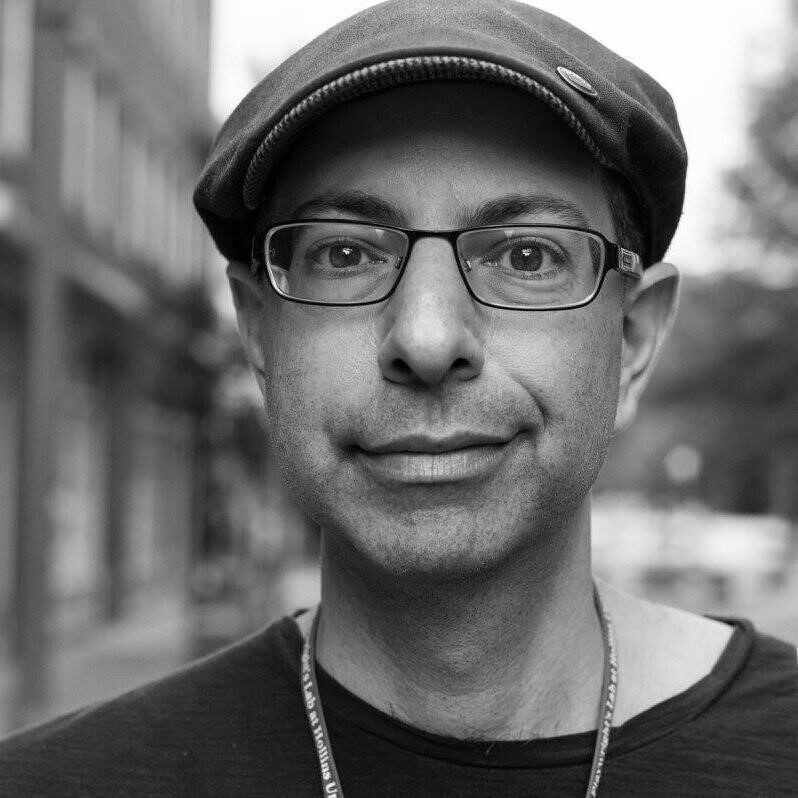
Photo by Jonathan Dorf
This post was written by the author in their personal capacity.The opinions expressed in this article are the author’s own and do not reflect the view of The Theatre Times, their staff or collaborators.
This post was written by Vanessa Diego.
The views expressed here belong to the author and do not necessarily reflect our views and opinions.

